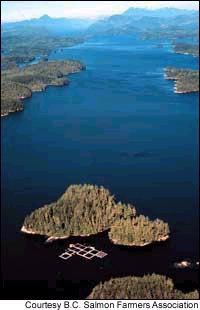forum
library
tutorial
contact

|
the film forum library tutorial contact |

|
B.C. Fish Farms Damage Environment, Former Judge FindsEnvironmental News Network - December 4, 2001 |
 Aquaculture is damaging the marine environment of British Columbia, and some practices may be illegal according to an independent inquiry conducted by a former judge of the B.C. Supreme Court.
Aquaculture is damaging the marine environment of British Columbia, and some practices may be illegal according to an independent inquiry conducted by a former judge of the B.C. Supreme Court.
The Leggatt Inquiry into Salmon Farming in British Columbia found that salmon farm net cages pose a threat to wild salmon and the marine environment and should be removed from the waters of British Columbia on Canada's west coast.
"There is no question that net cages are the root cause of environmental damage, including massive escapes of Atlantic farm salmon, disease transfer and pollution of marine waters and the ocean floor," said Stuart Leggatt, the former judge who conducted the inquiry.
Leggatt recommends that all net-cage salmon farms be removed from B.C. waters within three years in his report, "Clear Choices, Clean Waters," released November 29 in Vancouver.
The Leggatt inquiry was established by the David Suzuki Foundation, a Vancouver-based environmental non-profit organization, but the inquiry set its own terms of reference and operated independently of the foundation.
Of the 104 fish farm sites along the coast of British Columbia, 98 are operating. A moratorium on new aquaculture sites has been in place since 1995. The Leggatt inquiry recognized that industry operators and supporters would like the industry to expand so that B.C. fish farms can better compete with those in Norway, Scotland and Chile, creating new jobs and increasing government revenues.
But the B.C. Salmon Farmers Association (BCSFA) would not participate in an eight day series of public hearings on salmon aquaculture held in coastal communities in October.
BCSFA Executive Director Anne McMullin said, "Like the federal and provincial governments, our members refuse to legitimize the Suzuki Inquiry by participating in it. This is a PR exercise designed, paid for and orchestrated by an organization that has consistently opposed our industry. We feel very strongly that this is not the right vehicle to advance public or official understandings about salmon farming in B.C."
Leggatt urged government and industry to work together to assess various fish farm systems that minimize environmental damage. Two such systems were presented to the inquiry, a land-based salmon farm near Nanaimo, B.C., and a solid-wall floating marine operation in Washington state.
Leggatt also warned that by operating in territories that are subject to unresolved aboriginal claims and failing to effectively consult First Nations, the industry may be violating aboriginal rights. He referred to a court decision of 1998 which requires consultation or consent of aboriginal nations on decisions affecting their territories. He recommended meaningful consultation and involvement of First Nations in the industry as a means of resolving legal conflicts with aboriginal groups.
Leggatt also found that industry pollution may be violating federal fisheries law. "A specific finding is that pollution of the environment caused by net-cage salmon farming may well violate the federal Fisheries Act, particularly Sections 34 and 35 that deal with fish habitat protection and pollution prevention," he said.
But McMullin said the inquiry's findings lack legitimacy.
"B.C. salmon farmers have worked collaboratively with government regulators and public stakeholders since 1995 to identify legitimate concerns and address them through operational and regulatory change. The Suzuki Foundation has not seen fit to participate in any of these processes," she said.
"Now, all of a sudden, this unelected and unaccountable group has appointed itself official arbiter for our industry. Accepting the Suzuki Foundation in this role would be a renunciation of all the work done by industry, government and public stakeholders within the official process to improve the performance of the province's salmon aquaculture sector," she said.
Leggatt presented six recommendations to Prime Minister Jean Chretien and B.C. Premier Gordon Campbell:
learn more on topics covered in the film
see the video
read the script
learn the songs
discussion forum
